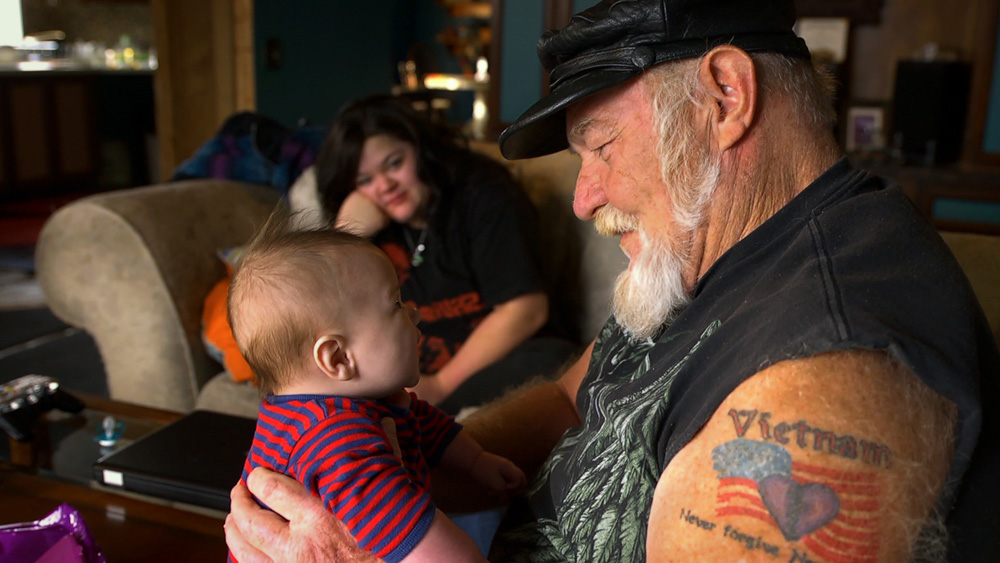Throughout the production of Debra Granik’s latest film, there was the ongoing question of what to call it. For a time, it had been called “Jesus and Angel: Welcome to America,” referring to the 19-year-old twins who come into the life of Vietnam war vet and Harley aficionado Ron Hall when Hall’s new wife Alicia emigrates from Mexico to the outskirts of Branson, Missouri. Then another two months passed where Granik wanted to name it after the Jim Croce lyric “Snake Around My Ankle” because she liked the way Hall sang it. Ultimately, Granik and her small band of collaborators that included longtime producer Anne Rosellini, editor Victoria Stewart and cinematographer Eric Phillips Horst, would settle on the most natural choice, “Stray Dog,” taken from Hall’s nickname.
Of course, every choice Granik has made in her films going back to her arresting 2004 debut “Down to the Bone” has felt as if it were the most natural, even if it’s taken considerable time and effort to reach that point, which is why it’s slightly surprising that “Stray Dog” has become the director’s first feature-length documentary. After guiding Vera Farmiga and Jennifer Lawrence in the roles that made them famous for disappearing into them so completely, Granik has essentially done the same as a filmmaker with her portrait of Hall, a film that gracefully depicts a gregarious biker with a fragile psyche. Not far from where she filmed “Winter’s Bone,” which is how the director met Hall during location scouting, Granik immerses herself in trailer park he runs, quietly observing Ron busy himself by tending to his tenants’ concerns such as warped floors and paying for costly dental work while joining him on the weekends when he mounts his motorcycle to ride with fellow war vets, visiting the Vietnam War Memorial and making time to talk to soldiers who have recently come home.
Always clad in a leather vest, you come to discover that Ron is exposing more of himself to the world than just his biceps for the first time in quite awhile in front of Granik’s lens, finally choosing to speak to a VA therapist rather than his preferred psychological remedy of whispering sweet nothings to the open road and settling into a new marriage that introduces his wife’s teenage sons into his life as well. After collecting 230 hours of footage from four intense shoots between May 2010 and March 2013, Granik and her team fashioned a lovely study of a complicated man while also providing rare insight into those often considered others in American life, whether it’s veterans, immigrants or those living at the lowest rungs of society with no complaint, with great compassion and depth. Shortly after the film premiered at the Los Angeles Film Festival, where it would go on to win the festival’s Jury Prize, Granik spoke about how Ron went from helping to fill the bar scene in “Winter’s Bone” with his friends to filling the screen himself, making her documentary debut and her favorite verb.

My whole life as a filmmaker, I’ve always had some documentary running in the background. Because they end up being longitudinal, I often have trouble understanding where I can start and stop. For whatever reason, the timing was right [for “Stray Dog”], and having some really good partners to work with, I realized it’s okay to make something that won’t necessarily have an end or an answer. It will be a portrait of some themes and elements of someone’s existence, but it may end up having some universal connections to people. We may not all be veterans. We may not all live in one region or another, but no matter what, the magic when you look at any life is you realize you understand a feeling that a person lives with that is very similar to a feeling that you yourself live with.
With this particular film, I didn’t start saying, conceptually, I want to find a man, or an individual, who has x, x, and x [qualities]. I saw one element of him. Then, going back, some other layers revealed. Whatever gave us the green light in our heads [to make the film], I’ll never really know. Sometimes I chalk it up to the fact that sometimes when you’re invited to have a conversation with someone that you didn’t expect to invite you, it’s just a little bit of a shock. You’re just like, I’ve got to take this offer. I didn’t expect that Ron would say, come on in to my park and sit down for a minute, and we can talk. I don’t know why I didn’t expect that, but I didn’t.
One of the fascinating things about this film is how it parses out information. You get everything you need as a viewer, but I’m not sure you even hear Stray Dog’s real name Ron until midway through the film. Was it easy to find that path?
Not at all. In terms of dispersal of information, there’s very different thresholds that viewers have. It’s a real spectrum about human perception and comfort levels, and also national traditions. We happen to have a storytelling tradition that really has been quite tightly predicated on very rapid dispersal of information. I feel we live now in a storytelling culture that’s very uncomfortable with not knowing something. Or having to piece it together ourselves. I say this reverentially, because I am part of the culture, it’s not like I stand outside it, but what that predicament [creates is] a lot of pressure to fill in things. There were many days when we were like, “Okay, we will have to use voiceover.” We weren’t against it. We recorded hours of interviews with Ron, and we’re putting some up on the website, only because there was just some very beautifully worded, almost riddles about existence that he would sometimes put out there and some of his neighbors had beautiful comments and interesting insights about things.

I recently saw a film that’s making a really big trip around the world called “Sacro Gra,” Gianfranco Rosi’s film. He doesn’t really explain anything at all, even to the point where you are in this big ring-road [highway] around Rome and [during] his Q and A, [he said] “I had no impulse to really clarify where exactly the coordinates were that I was filming.” I wanted the viewer to sink in and have to wonder. Not at frustrating level – it’s not saying, let’s pull out some Brechtian techniques of rupture. But I do appreciate that we put out films where there’s lots of room for each of us to impute, infer, chew, and wonder. Wonder is my big thing. The active verb of wondering.
When “Winter’s Bone” came out, many considered the film bleak, though it showed a strength of community you can see in “Stray Dog.” Was it interesting, or even perhaps a responsibility, to show an experience that while no less fraught with economic concern is considerably lighter?
Yes. Oh, it’s delightful. A term that was used years ago that has stuck with me is scrappy survival, which curves toward optimism. Scrappy survival means, in my observations, tenacity, that impulse to carry on, but to do so when possible with some humor, be it dark or just the way that you make a neighbor laugh. I love the laughter among the men in that RV park. I love them kidding and funning, and small excuses to make merriment [such as] peppering your year with a chili supper covered dish event.
I love that about anybody’s culture, but I really loved that about the biker community. The community I was photographing wasn’t one-percenters, it was the civic incarnation of people [who] in previous parts of their life had been involved in a tougher kind of culture and at this point, I get so high seeing a group of bearded men talk like, “Who’s going to bring the onions?” when they were planning a chili dinner. The reason I bring this up is that there was a will to have fun, a collaborative spirit. That’s one of the gifts of some parts of the middle of the country. I don’t want to say it was old-timey – everyone’s wired to the gills and social media savvy – but within that, I still felt there was this will to stave off dreariness and to keep life having a texture of cycle and camaraderie. Biking for so many men and women really does facilitate that.
Then, as Ron loves to pontificate about why [the biking community has] been so important to vets, it’s a deployment, really, of something that happened in their wiring, their adrenaline, and in their psyche, that coming home they needed something that would help absorb, and feather back in to society, something that had been supercharged in their existence. Ron really has the history down that biking really grew out of the World War II vets.

In the last couple of days, because of the film becoming public, people have asked me, why was Ron open to it? Ron is an utterly private individual. He doesn’t post a blog about his life or about himself as a vet. But he was hermetic and cut off. Ron being open to counseling was very recent in his life. He doesn’t proselytize, but he felt like something very heavy and lifelong was somewhat lifted off his shoulders, and he does want to reach out. When he sees someone that’s not feeling right, he wants to at least impart to them that there’s a really progressive arm of VA counseling, that’s no longer the clinician somehow talking you out of your PTSD, or putting you in a psych ward. What the breakthrough was, and Ron would say this, is that combat veterans are now often the therapists. That makes a lot of men and women feel so comforted. If you haven’t been in combat, it is extremely hard to believe, or understand that another person [who has], so talking to someone about combat who has experienced it has been the linchpin for many vets feeling like they could actually have their first honest conversation.
What’s it like catching someone like Ron at a big transition point in their life? I’ve heard his relationship with Alicia was still relatively new when you met and as you said, he’s entering into therapy for the first time.
Ron, for me, was a mystery. I sometimes call it the mystery of heterosexuality, like this person had lived in a way that was far simpler, with four dogs in a really small RV and he knew how to function within that life. Then he went and in some ways, disoriented himself. He fell really hard for this person, and wanted to be in a long-term committed relationship with her. It was really new and raw. It was like seeing someone become domesticated. Sometimes I was scared. And sometimes, the part of me being a female that wonders about being a man, was experiencing fear. I was like, “Oh shit, this is complicated! [laughs] This requires a lot of give and take, and this is intense. Is he going to be okay? Is she going to be okay? What will happen there?” And yet that’s something poignant about humankind, that everyone tries it. The feelings for it and why it’s all happening were really endearing and beautiful. Ron also really feels a lot of fulfillment from being needed and being a guide and being helpful. The fact there’s a language barrier between them was almost a positive factor. Some kind of lightness could come out of that linguistic barrier, of piecing things together.
“Stray Dog” opens July 24th at the Laemmle Music Hall in Los Angeles.




